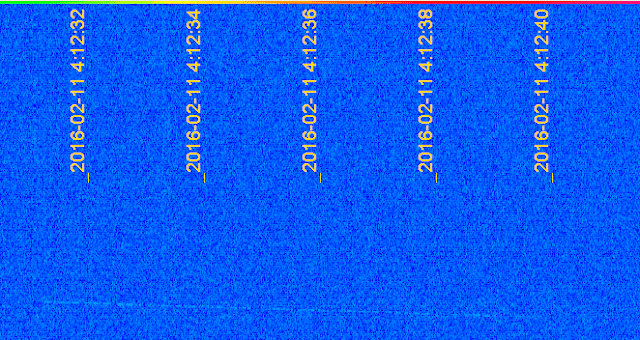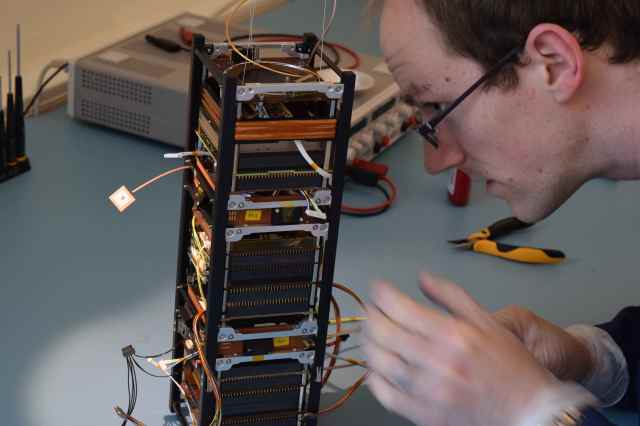
Home » Posts filed under AAUSAT-5
Showing posts with label AAUSAT-5. Show all posts
Showing posts with label AAUSAT-5. Show all posts
AAUSAT-5 LAUNCH MONDAY 5. October
At Fibigerstræde 15 (AAUs main cantina) 15:20 Doors open 15:40 Welcome, Dr Eskild Holm Nielsen, Dean of the Faculty of Engineering and Science, Aalborg University 15:45 Introduction to AAUSAT5 and GomX-3 deployment from the ISS, Jens Schiemann, ESA ISS operations LAUNCH FROM ISS: 15:55 AAUSAT5 and GomX-3 deployment: live link from the ISS, commented by Andreas Mogensen, ESA astronaut 16:05 The AAUSAT5 mission, Prof Jens Frederik Dalsgaard Nielsen 16:15 The GomX-3 mission, Lars Alminde, Chief Sales Officer, GomSpace 16:25 CubeSats at ESA, a new path for Education and Technology, Hugo Marée, Head of ESA Education and Knowledge Management Office, and Roger Walker, ESA Technology CubeSats Manager 16:40 Lecture: Living and working on the ISS, Andreas Mogensen 17:40 AAUSAT5 and GomX-3: what next? Prof Jens Frederik Dalsgaard Nielsen, and Kim Toft Hansen, GomX-3 Project Manager, GomSpace 17:50 Q&A & interviews 18:00 AAUSAT5 goes active and starts emitting beacon 18:30 End of event at Fibigerstræde 15 At Fredrik Bajersvej 7C in our SpaceLab we have our local Houston Control Room You are welcome to join us (300m walk from Fibigerstræde 15) 18:28 First pass to be received by our ground station in Austria WE HOPE TO HAVE CONTACT :-) Next pass at: 20:04 AAU 20:05 Austria
Launch Info
We hope to be deployed from ISS some time between 5 and 8 October
Viewable passes (based on ISS TLE) with elevation
greater than 10 degress will be something like: ( a pass will last less
than 10 minuttes)
So ... it seems that - depending of time of ejection from ISS - be lot of time to listen to AAUSAT5 'before we will see it in Aalborg. We really hope that you will help us.
NB NB : Time on the images below is in UTC so add 2 hours to get european/danish time (CEST)
AAU passes the first days
Add to 2 hours to get european time (its UTC time)AAU passes
TUW (Austria) passes the first days
Add to 2 hours to get european time (its UTC time)
TUW(Austria) passes
ISS CubeSats to deploy Monday, October 5
The European Space Agency (ESA) has announced that two Danish
CubeSats carrying amateur radio payloads should be deployed from the
International Space Station (ISS) on Monday, October 5
Originally launched to the ISS on August 19, 2015 the two CubeSats, AAUSat-5 and GomX-3, will be deployed from the ISS Japanese Kibo module airlock. An astronaut will manipulate the Kibo robotic arm to lift AAUSAT-5 from the airlock and place it in orbit.
Once deployed from the ISS the CubeSat will begin transmitting signals to Earth that can be picked up by anyone with common amateur radio equipment. The frequencies to listen on are:
AAUSat-5 – 437.425 MHz with 30 WPM CW beacon every 3 minutes and 9600 bps GMSK packet every 30 seconds
GomX-3 – 437.250 MHz with 1200-9600 bps GMSK data from a NanoCom AX100 using CSP protocol
In addition to the amateur radio payloads new radio technology being demonstrated by GomX-3 will support the tracking of civil aircraft and measuring telecom satellite signal quality. AAUSat-5 will demonstrate the tracking of ships on the open sea.
ESA article CubeSats set for Monday Release (with video)
http://www.esa.int/Our_Activities/Space_Engineering_Technology/ESA_CubeSats_set_for_Monday_release
ESA invites radio amateurs to listen for AAUSat-5 CubeSat
http://amsat-uk.org/2015/09/24/esa-listen-for-aausat-5/
Originally launched to the ISS on August 19, 2015 the two CubeSats, AAUSat-5 and GomX-3, will be deployed from the ISS Japanese Kibo module airlock. An astronaut will manipulate the Kibo robotic arm to lift AAUSAT-5 from the airlock and place it in orbit.
Once deployed from the ISS the CubeSat will begin transmitting signals to Earth that can be picked up by anyone with common amateur radio equipment. The frequencies to listen on are:
AAUSat-5 – 437.425 MHz with 30 WPM CW beacon every 3 minutes and 9600 bps GMSK packet every 30 seconds
GomX-3 – 437.250 MHz with 1200-9600 bps GMSK data from a NanoCom AX100 using CSP protocol
In addition to the amateur radio payloads new radio technology being demonstrated by GomX-3 will support the tracking of civil aircraft and measuring telecom satellite signal quality. AAUSat-5 will demonstrate the tracking of ships on the open sea.
ESA article CubeSats set for Monday Release (with video)
http://www.esa.int/Our_Activities/Space_Engineering_Technology/ESA_CubeSats_set_for_Monday_release
ESA invites radio amateurs to listen for AAUSat-5 CubeSat
http://amsat-uk.org/2015/09/24/esa-listen-for-aausat-5/
ESA invites radio amateurs to listen for AAUSAT-5 CubeSat
The AAUSAT-5
amateur radio CubeSat built by students at the University of Aalborg,
Denmark is planned to be released from the International Space Station
sometime in the week of October 5.
The European Space Agency (ESA) is inviting radio amateurs to listen out for the signals from the satellite. The first to send in a recorded signal from AAUSAT-5 will receive a prize from ESA’s Education Office.
Launched on August 19, 2015 to the ISS, the Danish student CubeSat is now waiting for its deployment from the Japanese Kibo module’s airlock. An astronaut will manipulate the Kibo robotic arm to lift AAUSAT-5 from the airlock and place it in orbit.
Once deployed from the ISS the CubeSat will begin transmitting signals to Earth that can be picked up by anyone with common amateur radio equipment. ESA challenges anyone to record the signal and send it to ESA (cubesats@esa.int) and Aalborg University (studentspace@space.aau.dk).
The satellite will transmit on 437.425 MHz using CW and GMSK. The 30 WPM CW beacon will transmit every 3 minutes and the 9600 bps GMSK every 30 seconds.
The first correct email received will win the following prizes:
• ESA/AAUSAT5 poster with signatures of the team members
• ESA Education goodie bag
• Scale 1:1 3D printed model of the AAUSAT-5 satellite
Read the ESA article at
http://www.esa.int/Education/CubeSats_-_Fly_Your_Satellite/Be_the_first_to_catch_the_signals_from_a_new_Satellite_in_orbit
AAUSAT-5 amateur radio information http://www.space.aau.dk/aausat5/index.php?n=Main.HamInfo
ESA AAUSAT-5 Twitter hashtag #AAUSAT5 https://twitter.com/ESA__Education
Danish CubeSats head for ISS http://amsat-uk.org/2015/08/19/danish-cubesats-head-for-iss/
The European Space Agency (ESA) is inviting radio amateurs to listen out for the signals from the satellite. The first to send in a recorded signal from AAUSAT-5 will receive a prize from ESA’s Education Office.
Launched on August 19, 2015 to the ISS, the Danish student CubeSat is now waiting for its deployment from the Japanese Kibo module’s airlock. An astronaut will manipulate the Kibo robotic arm to lift AAUSAT-5 from the airlock and place it in orbit.
Once deployed from the ISS the CubeSat will begin transmitting signals to Earth that can be picked up by anyone with common amateur radio equipment. ESA challenges anyone to record the signal and send it to ESA (cubesats@esa.int) and Aalborg University (studentspace@space.aau.dk).
The satellite will transmit on 437.425 MHz using CW and GMSK. The 30 WPM CW beacon will transmit every 3 minutes and the 9600 bps GMSK every 30 seconds.
The first correct email received will win the following prizes:
• ESA/AAUSAT5 poster with signatures of the team members
• ESA Education goodie bag
• Scale 1:1 3D printed model of the AAUSAT-5 satellite
Read the ESA article at
http://www.esa.int/Education/CubeSats_-_Fly_Your_Satellite/Be_the_first_to_catch_the_signals_from_a_new_Satellite_in_orbit
AAUSAT-5 amateur radio information http://www.space.aau.dk/aausat5/index.php?n=Main.HamInfo
ESA AAUSAT-5 Twitter hashtag #AAUSAT5 https://twitter.com/ESA__Education
Danish CubeSats head for ISS http://amsat-uk.org/2015/08/19/danish-cubesats-head-for-iss/
Subscribe to:
Posts (Atom)Template Responsive Design














